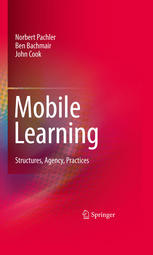

Most ebook files are in PDF format, so you can easily read them using various software such as Foxit Reader or directly on the Google Chrome browser.
Some ebook files are released by publishers in other formats such as .awz, .mobi, .epub, .fb2, etc. You may need to install specific software to read these formats on mobile/PC, such as Calibre.
Please read the tutorial at this link: https://ebookbell.com/faq
We offer FREE conversion to the popular formats you request; however, this may take some time. Therefore, right after payment, please email us, and we will try to provide the service as quickly as possible.
For some exceptional file formats or broken links (if any), please refrain from opening any disputes. Instead, email us first, and we will try to assist within a maximum of 6 hours.
EbookBell Team

4.8
74 reviewsAs with television and computers before it, today’s mobile technology challenges educators to respond and ensure their work is relevant to students. What’s changed is that this portable, cross-contextual way of engaging with the world is driving a more proactive approach to learning on the part of young people.
The first full-length authored treatment of the relationship between the centrality of technological development in daily life and its potential as a means of education, Mobile Learning charts the rapid emergence of new forms of mass communication and their potential for gathering, shaping, and analyzing information, studying their transformative capability and learning potential in the contexts of school and socio-cultural change. The focus is on mobile/cell phones, PDAs, and to a lesser extent gaming devices and music players, not as "the next new thing" but meaningfully integrated into education, without objectifying the devices or technology itself. And the book fully grounds readers by offering theoretical and conceptual models, an analytical framework for understanding the issues, recommendations for specialized resources, and practical examples of mobile learning in formal as well as informal educational settings, particularly with at-risk students. Among the topics covered:
• Core issues in mobile learning
• Mobile devices as educational resources
• Socioeconomic approaches to mobile learning
• Creating situations that promote mobile learning
• Ubiquitous mobility and its implications for pedagogy
• Bridging the digital divide at the policy level
Mobile Learning is a groundbreaking volume, sure to stimulate both discussion and innovation among educational professionals interested in technology in the context of teaching and learning.